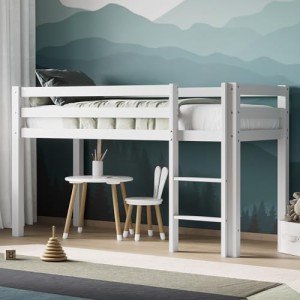Bunk Beds for Kids: A Comprehensive Guide
Bunk beds have actually been a popular option for kids's bed rooms for many years. They use a space-saving option that optimizes floor location, provides enjoyable climbing up alternatives, and can be found in a range of styles that interest children's imaginations. This article checks out the benefits, considerations, designs, and safety features related to bunk beds for kids.
Benefits of Bunk Beds
Bunk beds present numerous benefits that make them an appealing option for families. Here are some crucial advantages:
Space Saving
- Bunk beds allow 2 or more children to share a room without sacrificing space for play or other activities.
Cost-Effective
- Acquiring a single bunk bed can be more cost-effective than purchasing 2 separate beds.
Enjoyable Factor
- Kids typically see bunk beds as an enjoyable place to sleep and play, promoting a sense of adventure.
Flexibility
- Bunk beds are readily available in different configurations, including L-shaped, loft beds, and even convertible styles that can change as kids grow.
Organization
- Numerous bunk beds feature integrated storage options, such as shelves and drawers, assisting keep rooms arranged.
Secret Considerations Before Purchasing
Before investing in a bunk bed, it's important to consider specific elements, such as:
- Space Requirements
Measure the space to guarantee that there suffices vertical space, enabling appropriate headroom on the top bunk. - Age of Your Children
Consider their age and maturity. Many makers recommend that kids under 6 should not oversleep the leading bunk due to safety concerns. - Weight Limit
It's important to inspect the weight limitations of the bunk bed for both the leading and bottom bunks to make sure safety. - Design Preferences
Select a design that matches the room's design and the children's preferences. - Product
Bunk beds are available in different materials, such as wood or metal. Each has its benefits and disadvantages relating to toughness and visual appeals.
Designs of Bunk Beds
Bunk beds can be found in various designs to fit different aesthetics and practical needs. Here's a list of some popular designs:
- Standard Bunk Beds
Timeless stacked beds that include two beds developed one above the other. - Loft Beds
A bed raised high off the ground, with space underneath for a desk, play location, or storage. - L-Shaped Bunk Beds
Two beds arranged in an L-shape, supplying more flooring space and an unique style element. - Twin Over Full Bunk Beds
These alternatives include a twin bed on top and a full-sized bed on the bottom, accommodating older children or adults. - Triple Bunk Beds
Designed for 3 kids, these beds normally consist of three stacked beds, ideal for bigger families.
Safety Features to Consider
Guaranteeing the security of children using bunk beds is critical. Here are some security includes to try to find before making a purchase:
- Guardrails
A bunk bed ought to include sturdy guardrails on the leading bunk to avoid unintentional falls. - Ladders
Make sure that the ladder is firmly connected and simple for children to browse safely. - Stability
Try to find bunk beds with lower center of mass and broad bases to provide better stability. - Quality Construction
Choose beds made from resilient materials that fulfill safety requirements, such as ASTM (American Society for Testing and Materials) policies.
FAQs About Bunk Beds
1. What age is appropriate for a top bunk?Generally, kids aged 6 and older are advised for sleeping in the top bunk. 2. Are bunk beds safe for toddlers?Most specialists encourage against
placing toddlers in the leading bunk due to the
risk of falls and improper ladder usage. 3. Can bunk beds be separated?Many bunk beds are developed to be separated into two standalone beds,
providing included versatility as kids grow
. 4. How do Cheap Bunk Beds preserve a bunk bed?Regularly look for loose screws and use, keep mattresses clean, and ensure that the bunk bed is
stable to extend its life expectancy. 5.
Exist any special bed mattress requirements for bunk beds?Yes, bed mattress for bunk beds ought to fit comfortably without leaving gaps. Normally, thinner mattresses
(around 6 to 8 inches )are advised for top bunks for safety. Bunk beds provide a flexible, practical, and fun service for children's sleeping arrangements, taking full advantage of space while accommodating several kids in one space. By thinking about the essential elements
of design, security, and space, moms and dads can make a notified choice when choosing the best bunk bed for their children's needs. With the right care and upkeep, a bunk bed can be a beloved piece of furnishings that offers years of use and satisfaction for kids. Summary Table of Bunk Bed Styles Design Description Best For Requirement Bunk Beds Timeless style, 2 stacked beds Smaller rooms Loft Beds Raised bed with open space below Research study or play locations L-Shaped Bunk Beds 2 beds in an L-shape
Included floor space Twin Over Full Twin on top,
| full on bottom Accommodating older children Triple | ||||||
|---|---|---|---|---|---|---|
| Bunk Beds | Three stacked beds | Bigger families By comprehending | the different choices readily available, designated considerations for safety and performance, and proper age standards, households | can choose the perfect bunk bed that not | just improves their living space | but also ensures a safe and |
| enjoyable sleeping environment | for their kids.

|
